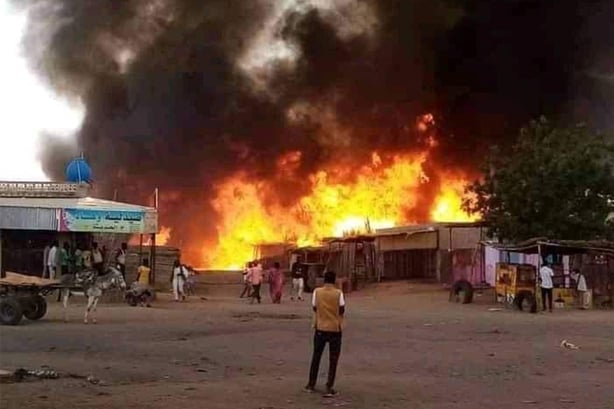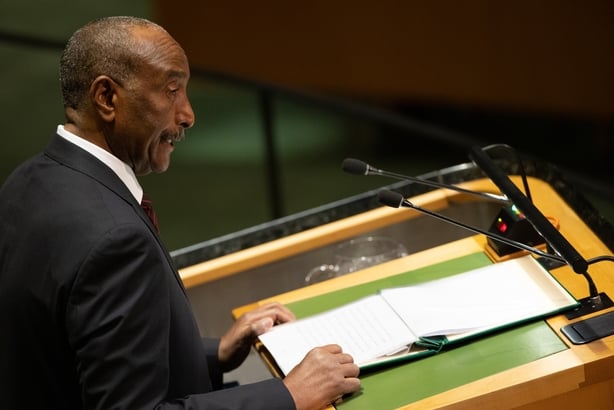When reports of mass atrocities in Darfur emerged early this century, horror rippled across the world.
People marched on the streets. George Clooney launched a global campaign for action.
Speaking outside the UN Security Council, Joe Biden - then a Senator - said genocide was taking place and the international community had "an obligation to respond".
Today, militia groups are once again accused of carrying out ethnic cleansing.
Further mass killings of civilians are imminent with rebel forces closing in on camps for internally displaced people in Darfur, experts warned.
It comes at a time when the United Nations is preparing to withdraw its political mission from Sudan.
Rights groups told RTÉ News they were shocked at the "silence" from the international community.
"We've issued warning after warning about what was going to happen if the international community did not respond," Nathaniel Raymond, a human rights investigator, said.
He said his team at the Yale Humanitarian Research Lab had been watching events in Sudan from satellite imagery and open-source data collection since hostilities broke out in April.
What he feared then would occur, has occurred and is continuing, he said.
"That is the mass killing of non-Arab civilians in Darfur. Nobody cares," he added.

This latest outbreak of hostilities between the Sudanese army and paramilitaries, began in April, quickly engulfing the capital Khartoum and triggering violence in Darfur.
It boils down to a power struggle between the army chief Abdel Fattah al-Burhan and his former deputy, Rapid Support Forces (RSF) commander Mohamed Hamdan Dagalo, known as Hemeti.
Both have been accused of carrying out atrocities.
Hemeti was a leader of the notorious Janjaweed militia who raped and murdered thousands of civilians in Darfur in the early 2000s.
Now they are back to "finish the job" as one analyst put it.
The world has responded with silence, said Mathilde Vu of the Norwegian Refugee Council.
"We always talk about 'never again' but we’ve seen two ‘never agains’ in the past six months alone in Sudan," she added.
RSF and allied Arab fighters carried out a weeks-long assault on civilians from the Masalit tribe in Al Geneina, West Darfur, in June.
In the wake of the attacks, satellite images revealed mass graves.
The militias attacked again in early November, this time targeting the people who had survived the first massacre.
Now RSF forces are bearing down on El Fasher, North Darfur, home to hundreds of thousands of civilians.
If El Fasher falls, the RSF will be able to complete the genocide begun by the Janjaweed through ethnic cleansing of those they have not displaced or killed so far, Mr Raymond said.
But there has been no coordinated international response, he said, to the clear and present danger to the survival of people in Darfur or the rest of Sudan.
On Thursday this week, UN experts said in a statement that they were "appalled by the use of sexual violence as a tool of war".
"The world must not turn a blind eye to the atrocities and large-scale sexual violence unfolding in Sudan," the experts said.
But that statement was issued on the eve of the UN Security Council’s vote to shutter its political mission in Sudan, known as UNITAMS, which replaced the UN peacekeeping force in 2020.
The drawdown came in response to a request from the de facto Sudanese authorities for the UN to terminate the mission with immediate effect.
Without the consent of the host government, the mission could not continue, Council diplomats said.

But observers said the UN was turning its back on civilians in Darfur at their time of greatest need.
Over the past few months, the Security Council persistently failed to address the spiralling violence in Sudan, according to Mohamed Osman of Human Rights Watch.
"Some members, including Gabon, Ghana, Mozambique and the United Arab Emirates, have blocked the Council’s efforts to condemn the abuses," he said.
The UN missions denied the allegation in correspondence with RTÉ News.
The UAE, current host of the UN’s climate summit COP28, also "categorically refuted" media reports that they were supplying arms to RSF fighters in Sudan.
Now with the UN political mission preparing to leave, the people of Sudan feel abandoned, Mr Osman said. The UN Security Council should have explored more options for civilian protection, he said, instead of just "washing their hands" of the situation there.
It showed the failure and weakness of the United Nations under the leadership of António Guterres, Amgad Fareid, adviser to the former Prime Minister of Sudan said, calling the Sudanese army's objections to the mission a "pretext".
"The withdrawal of the UN from Sudan in times of war, when it is most needed, will be testimony of the death of all claims about the role of the UN in ending conflicts," he said.
"If you have a bad performance of a mission, you improve it," he said. "You don’t kill it altogether."
A spokesperson for the Secretary General insisted that the UN was not leaving Sudan.
"I think it is very important for people to remember that we have humanitarian colleagues in large numbers who remain present in Sudan, assisting people who are in dire humanitarian need," said spokesperson Stéphane Dujarric.
The UN had supplied aid to 4.5 million people since the outbreak of hostilities, Mr Dujarric added.
He said the responsibility for the conflict in Sudan rested with the warring generals and to blame the Secretary General was a "misreading of the reality".
Aid efforts in the country, where an estimated six million people are displaced, have been hampered not just by fighting but by a lack of funds too.
So far, the UN’s humanitarian response plan has received just over a third of the funding it appealed for.
Neighbouring Chad, which is also in the grip of a severe humanitarian crisis, has taken in hundreds of thousands of Sudanese refugees so far this year.
Daniel Sullivan of Refugees International interviewed new arrivals on the Chad-Sudan border in early November.
"Most of them were from the Masalit tribe and they were asked what their tribe was, as people were coming door-to-door looting and shooting arbitrarily, executing the men," Mr Sullivan said.
"I spoke with women who had experienced sexual violence or seen others who were taken," he said.
On Thursday, 50 rights organisations wrote an open letter calling on the US administration to issue an 'atrocity determination' on Sudan, which would trigger a definitive response to the conflict, including sanctions on warring parties and their supporters.
A spokesperson for the US State Department said the atrocities occurring in West Darfur and other areas were "an ominous reminder of the horrific events that led the United States to determine in 2004 that genocide had been committed in Darfur".
The spokesperson would not be drawn on whether the US was likely to make the same judgment this time.
But the international community can’t claim they didn’t know, Mr Raymond said.
"When crimes against humanity occur and the world fails to act, we're all culpable," he added.







